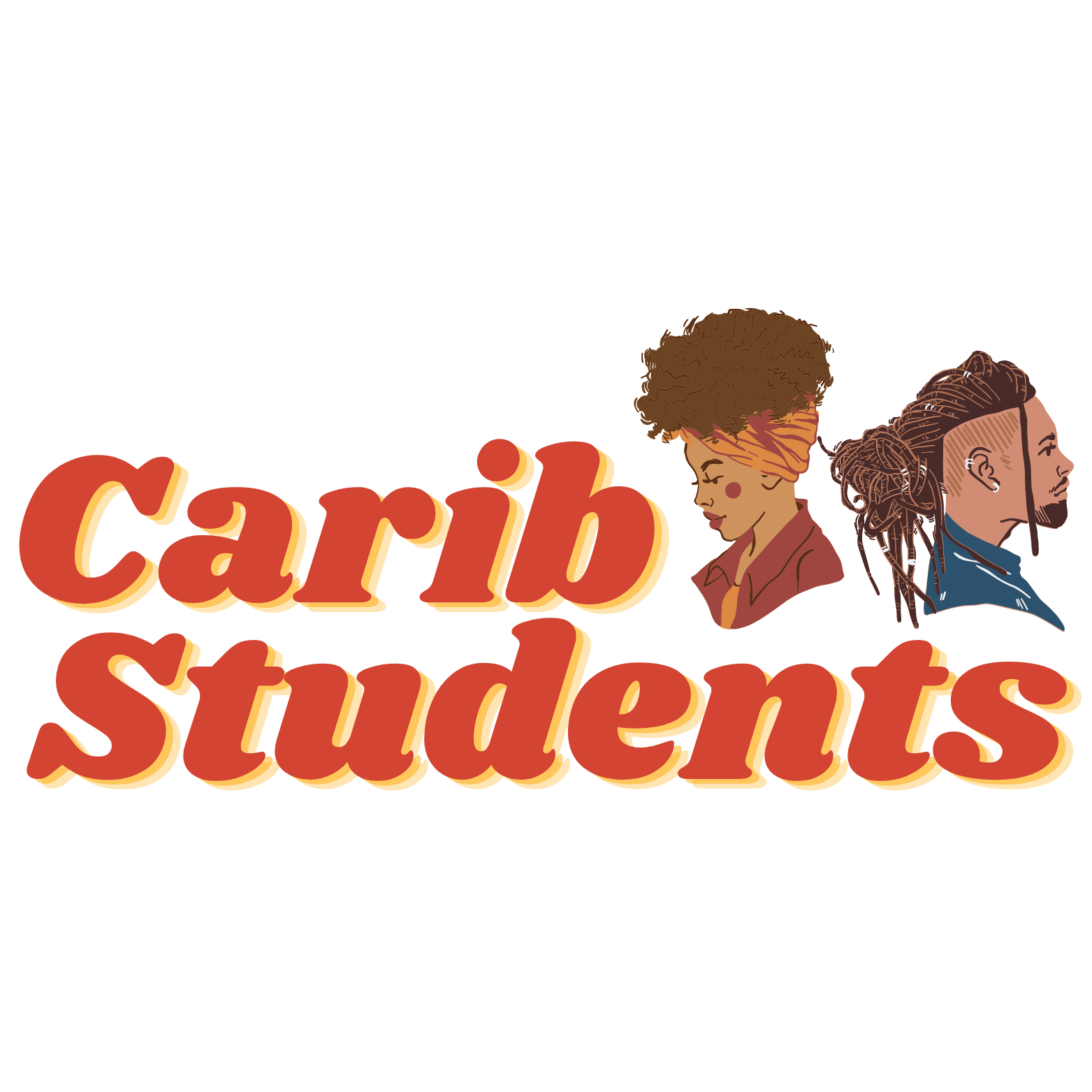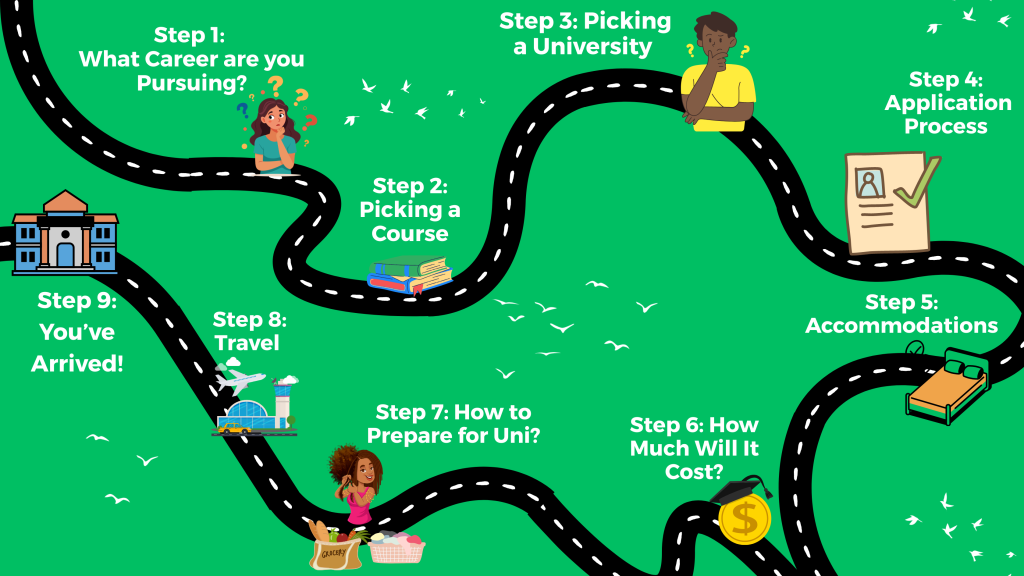Pathway B
This pathway is for students who have achieved qualifications up to A Level/CAPE and are looking to pursue Higher Education studies.
Step 1: What Career are you pursuing?

There are SO MANY courses available in England. If you don’t know what career is available for the subject area/s you are interested in then search the word on the UCAS website and see what courses come up.
Example: I typed in the word ‘SPACE’ and 65 Courses and 39 Apprenticeships appeared.
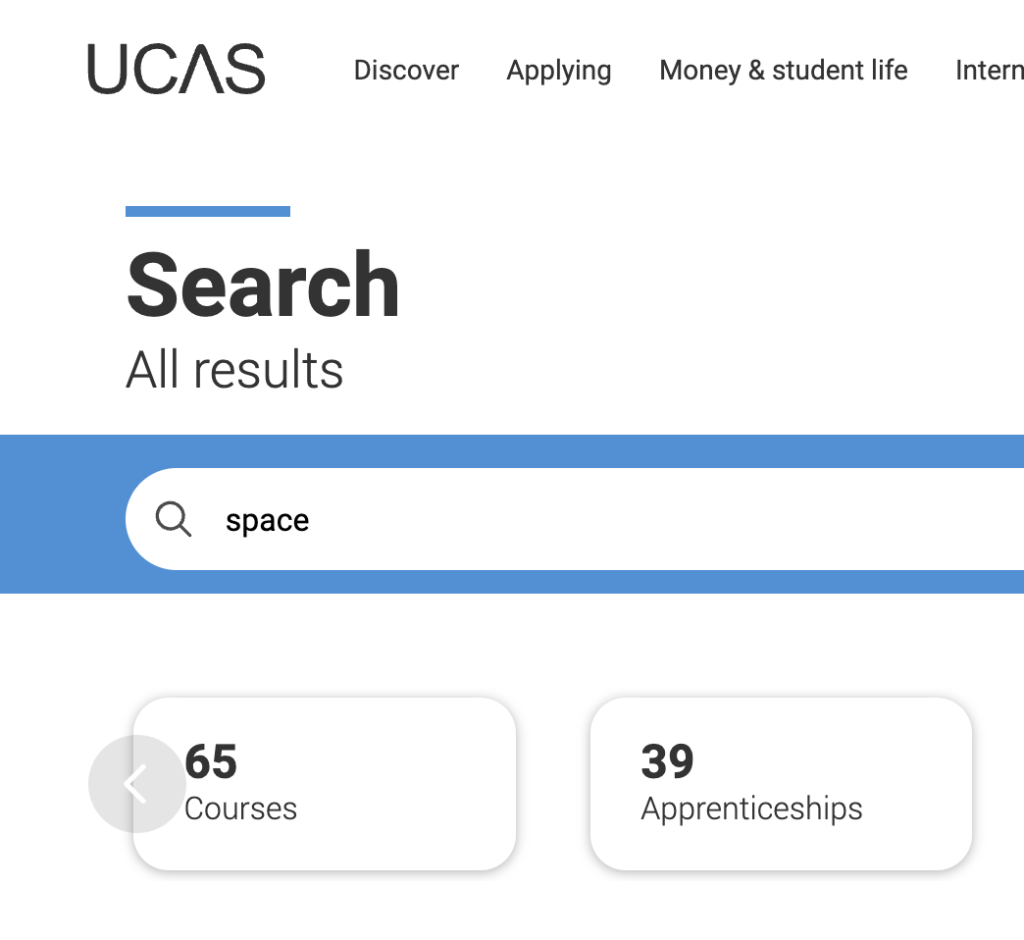

Why is the answer to this important?
Knowing the jobs or career that you hope to pursue after university will let you know what requirements are needed and that will inform you on what courses you should take.
It can be as simple as picking a course that is heavy practically then theory because the job wants to see that you have some experience applying the knowledge in the role or subject area you are applying for.
This could be the projects asked of you for your assignments.
OR
Whether the course comes with work placements. That could lead to employment straight after university because if the company likes your work they will make an offer after you’ve completed. Maybe even before
Example:
Students always talk about how jobs always want you to have years of experience and they don’t understand how one could receive it while studying.
Truthfully it is possible.
Author Note: For me, I was able to apply for small jobs within or outside of the university because it was part of their services. So when searching for universities you can see if thats something that they offer. Or look at the businesses around the university and see if they offer part-time roles or traineeships/internships that you could apply for once you begin your studies. These sometimes happen during the summer.
The service offered at my university is called UNITEMPS. It is available at other universities.
I also created opportunities for myself. I had access to a lot of resources and I used that to provide services to my department which got me paid as well.
Step 2: Picking a Course
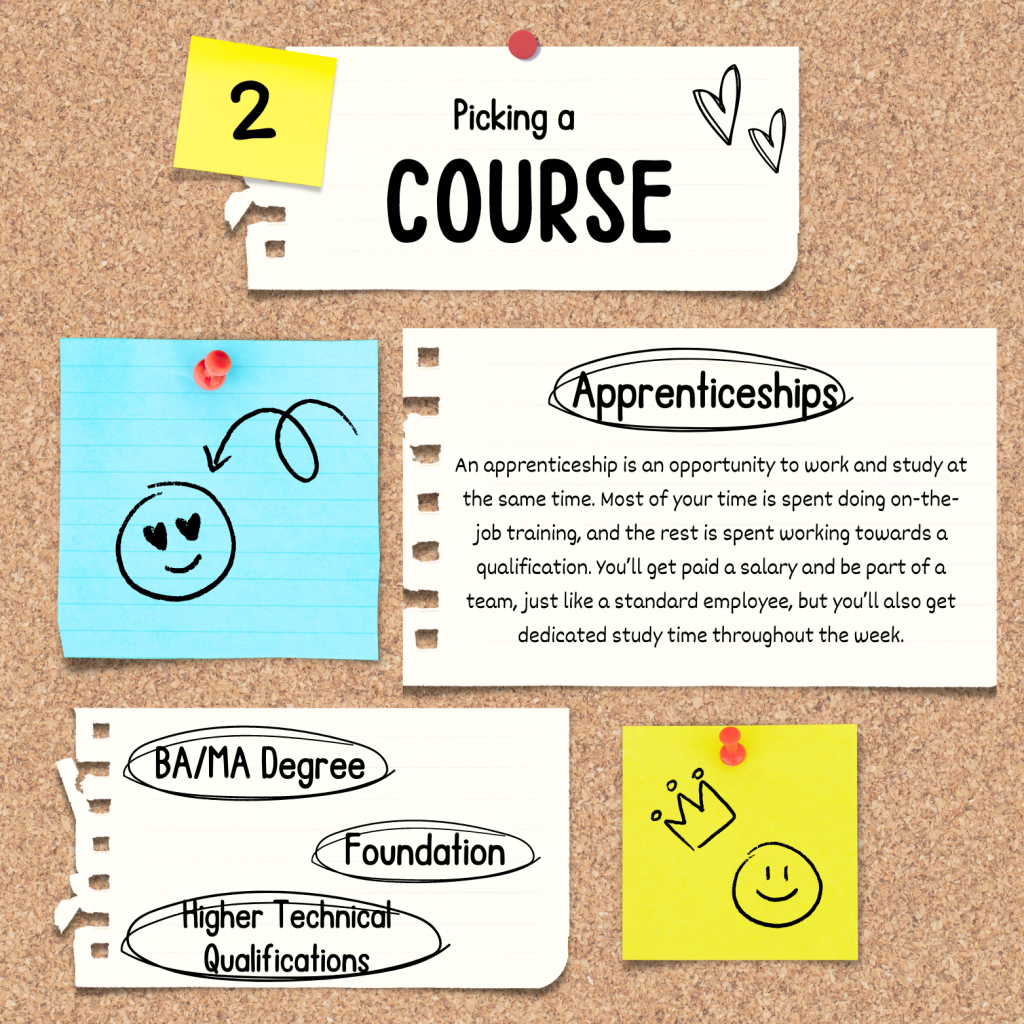
Understanding the British vs Caribbean Grading System.
British Level System
GCSE (CSEC)= Level 1-2
A-levels (CAPE) = Level 3
Undergraduate/Bachelor = Level 4-6
Post Graduate/Masters = Level 7
Doctorate = Level 8
CSEC to GCSE
Grade 1 CSEC = A/7 GCSE
Grade 2 CSEC = B/6 GCSE
Grade 3 CSEC = C/4 GCSE
You are currently learning about courses at Level 4
CAPE to A Level
Double Unit Subject at Grade 1 (CAPE) = A* (A-levels)
Double Unit Subject at Grade 1 (CAPE) = A (A-levels)
Double Unit Subject at Grade 2 (CAPE) = B (A-levels)
Double Unit Subject at Grade 3 (CAPE) = C (A-levels)
Double Unit Subject at Grade 4 (CAPE) = D (A-levels)
When you search for course on the UCAS website you will find that the entry requirments will say 80-104pts or 112 pts.
These are called UCAS Tariff points.
A points system that translates different qualifications into a numerical value so that universities can compare applicants.
A* = 56
A = 48
B = 40
C = 32
D = 24
E = 16
The points required are a combination of three A Level Subjects. Here are examples of Grade Combinations.
AAA* = 168
A*AA = 152
AAA = 144
AAB = 136
ABB = 128
BBB = 120
BBC = 112
BCC = 104
Use the table above to convert your CAPE grades to UCAS points.
Students can also apply with other A Level equivalent qualifications. To learn more about the other British equivalent qualifications click here.
Courses available
In England there a multiple qualifications to pursue. There are traditional courses and a blend of theory and practical courses.

Undergraduate
Level 4-6
Duration 3-4 years | Part-time and Full time at a university.

Undergrad with Foundation year
Level 3-6
4-5 years | Part-time and Full time at a university,

Apprenticeships
Level 3-7
Apprenticehips provide students the opportunity to learn on the job along with studying with a university or training provider. They are paid opportunities and can take 3-5 years to complete.

Hnc's or hnd's
Level 4
UCAS says ‘The Higher National Certificate (HNC), a one-year work-related course, is equivalent to the first year of a university degree programme.
Level 4-5
The Higher National Diploma (HND) is a two-year, work-related course, which is equivalent to the first two years of a bachelors degree.
As with a foundation degree, it is possible to progress from these courses to complete a full bachelors degree at a university, either through a specific top-up course, or by directly entering a degree in year three.
If you wanted to study a degree in stages, or exit after one or two years of study, the following qualifications may also be suitable.
They don’t directly lead to a degree, but you may be able go on and join the second or third year of a full degree (perhaps at the same university/college, or elsewhere) if you change your mind and want to graduate with a bachelors degree after all.
- One year of a degree – a Certificate of Higher Education (CertHE)
- Two years of a degree – a Diploma of Higher Education (DipHE)

Degree apprenticeships
Level 4-6
Degree Apprenticeships enables a student to get a full undergraduate or masters degree while working. These can take at least three years to complete.

Post graduate
Level 7
A qualification that you can take upon completing a bachelor’s degree or equivalent.
A master’s degree will usually take one year if studying full-time, or two years part-time.
Some undergraduate courses have a master’s degree included. These degrees take four years if studying full-time.
Questions to ask:
Does this course have work placement?
Work placements are perfect way to apply the knowledge you have learnt to a real company. Students who do well can sometimes be asked to stay on full time afterwards. Work placements can take place in the summer after your second year.
Does it have a year abroad?
Year abroad means that during your three years, usually the second year, a student will have the opportunity to study for either a full academic year or a semester at another university in another country. This could be in Europe, USA or Asia and other places.
What is the employability post graduation rate?
Some university websites will tell you on the course page what the rate of employability and the jobs that students secured. If it is not there, you can check websites like
Step 3: Picking a University

What to look for?
-
Job opportunities services
Author Note: The university I attended had a service called UNITEMPS which provided jobs from the university or from companies outside looking to employ students. The work would last for a few months at a time and was paid very well. UNITEMPS is available at other universities. You can check if the university you’re interested has it or their version of it.
Job opportunities are important because they help with giving you work experience and the money comes in handy.
-
Facilities
There are many universities across the country with state of the art facilities and some that are not. A course might sound good online based on descriptions but when you arrive you realise that the spaces you have to use aren’t the greatest. Like the university prioritised other subject areas and departments leaving you with little to nothing to work with.
Author Note: Look for schools that may specialise in the subject that you are interested in. Because that would mean that the facilities, teachers and other resources will be up to scratch.
-
Proximity to the City (to the action)
- Is there places to hang out for socialising?
- Can you go to the cinema or shopping?
- Does the city have good healthcare? Good hospitals in case of emergency
- Is it easily accessible for trains and bus?
- Maybe you don’t want to be hours and hours away from the closest family member or if that doesn’t bother you, you want to make sure that travel isn’t too difficult. Maybe your city is one of the major stops for trains so that means that train travel is frequent.
-
Clubs and Societies
-
Are there established clubs and societies that you are interested in and are they active online so you can see what they are up to?
-
You can check this on the universities’ website and the club/society’s respective social media accounts. You should definitely join at least one club or society while at university. It is a good way to make friends and it gives you something to do outside of your classes and work.
- What are students saying about their experiences at the university? Where is the school ranked against other schools across the country?
You can check this on websites like ‘The Student Room’ or ‘The Uni Guide’ or ‘The Uni Compare.’ These websites are perfect in understanding what students like about their universities. Whether is the facilities, available resources for studies or student life. The teachers and the assignments as well employment rates.
https://www.thestudentroom.co.uk/forum.php
-
-
Community
Do you want to be in a city that has diverse communities or would you like one that is full of people from your community?
Author Note: I chose my city on the basis that I wanted to be around people from other communities different than my own. Mine being from the Caribbean. Everything I knew about other countries is what I’ve seen online through social media or film and tv. I wanted to change that.
Step 4: Application Process
Everything you need to know to fill out the application can be found here. UCAS https://www.ucas.com/applying/applying-university/filling-your-ucas-undergraduate-application
Things to note:
- UCAS will ask you to select five universities courses. Some of your picks can be from the same university.
- It will ask you to write a personal statement. This format has changed for this upcoming year where students are asked to answer questions instead of writing an essay.
- There is application fee of £28.50 or between XCD $88.00-100.00.
- If you are an Overseas Territory Student, make sure you put your address of your island. You don’t need to put the address of a relative or other living in England. Because as a British Overseas Territory student you are entitled to paying Home Fees.
- Once you’ve been accepted your university will email asking you to prove your eligibility for home fees. This can easily be done with an approval letter from Student Finance England of your tuition loan, if that is something you decide to apply for. Or you can send them a document provided by the UK Government. Get it in our downloadable resources.
- You are going to need a reference.
- Employment History is just to see if you’ve done any work outside of your studies. It can be voluntary. Maybe you are a part of Rotaract or something similar.
- Grades: When applying to university, students must have 3 subjects at A Levels or Equivalent. The specific grade will be listed under ‘entry requirements’. Calculate your grades with the breakdown given above.
- If the website of the university does not have CAPE listed as an acceptable requirement don’t worry. CAPE And CSEC are listed in the application portal on UCAS. Email or call the university to confirm what they require to make sure you have everything needed to have a successful application.
- If you haven’t received you CAPE or equivalent grades at the time of application and are currently studying you can put your predicated grades in place. Ask your teachers what your predicated grades are if you don’t already know.
Example of entry requirements with CAPE grades:
- The University of Edinburgh requires students to have CAPE minimum three subjects at the double unit level with grades 1,2,2. Though the requirement needed for some of the courses may be higher because some courses are quite competitive. https://cahss.ed.ac.uk/international-eu/entry-requirements/west-indies-caribbean
Author Note: When applying for university courses you must have achieved a pass in GCSE/CSEC Maths and English (O-levels). For students not pursuing university courses that require Maths or English at A-level you can just apply with your chosen A-level subjects and your CSEC/GCSE/O-Level equivalent Maths and English grades.
- Example: A student could apply with History, Spanish and Politics at A-level and Maths and English at O-level. Leeds Business School
Author Note: For students who are not pursuing ‘Maths Based’ subjects do not have to take Maths and English for A-levels or equivalent courses unless asked by the school. I did a Performance Arts BTEC course (BTEC is an qualification that is equivalent to A Levels). When applying to university I used my CSEC maths and English grades.
Step 5: Accommodations
Author Here 🙂 Some uni’s have their own student accommodations but there are also private providers. I lived in private owned accommodations. Privated owned accommodations can be housing complexes built for students or homes repurposed for student accommodations.
Your uni’s website will have a section with the accommodations that you can apply to but for some you don’t get access to that until after you’ve been accepted.
I used the website amberstudent.com. You will find that most websites are offering the same accommodations in your area but some do have more options. When you use the website it will check with the accommodations for availabilty and then you can put a deposit to reseve your room.
The accommodations will have their own website where you will make an account to pay your rent. They will have a few payment plans, like every month or 3 times for the school year. It depends on the provider. If you are using student finance, student finance gives you your money 3 times a year so you can line up your rent payment with that.
Check Reviews
For every accommodation no matter if its from your uni or private, google it for reviews. Or you can check the reviews on the website or other student forums. You want to be at an accommodation that has good facilities but also friendly staff and a landlord who will fix any issues in your flat in a reasonable time and it is done well.
One night before I was about to go to sleep, my fire alarm started to make a noise. Safe to say it was hard to sleep and the worst thing was, it happened on the weekend. I had to wait until the Monday to get it fixed but, bright and early someone came in and fixed it. At another time, our flat’s kitchen microwave stopped working and the heater had issues and maintenance quickly replaced them with new ones.
So definitely check for students experiences to help with your choice.
Proximity to necessities
Pay attention to your accommodations proximity to supermarkets, pharmacy (Boots or other stores) bus stops or train stations. In England, walking is something you cannot avoid, but it will become your friend, don’t worry. It’s a good way to get to know the area around you especially if for one reason or another you need to walk home. Check the proximty to the city centre. My accommodations is about 12 mins walk to my city centre.
If your accommodations does not have a local supermarket around it like Lidl, Asda, Aldi or Tesco (Superstore not Tesco Express cause those are more pricer than the larger store.) I would avoid Sainsbury and Marks and Spencers for main necessities. There are pricier stores.
Room & Building
Get you an ensuite room, friend! This will come with your own bathroom and it will help you create your own sanctuary especially since you will have to share the kitchen and living room space. But it will also mean that your room will come a little more space than one with a shared bathroom.
If you believe that you will have a hard time sharing the kitchen space, I suggest getting a studio, but it will come at a steep price depending on where you are living. I won’t lie, living with other people can be quite hard because everyone has their own meaning of cleanliness, but this is not to say that it cannot work. My flatmates were good, and if I had any issue I addressed it with them and they mad adjustments. If your flatmates are cool, living with other people helps with the lonliness in the beginning and adjusting. Being able to see a face in the morning helps whether you realize it or not.
Note: You can always speak to your accommodations management to express your concerns and they might move you to another room. Every accommodation does checks every few months to assess the state of the rooms and living spaces.
Bed Size: Double bed is advised. Make sure to check the details for the sizes. Note: if you are like me at 5’8″ you will be hanging off the bed so I advise you get a king size duvet to help with the cold.
Laundry services: To get your laundry done may cost differently for everyone. My accomodation did not require me to add detergent, but my sister who lives in a different city her accommodations does require her to.
Click here for an example of an ensuite room in Liverpool.
Prices
Prices can range from £70 to £200+ weekly. £70 would be a room with a shared bathroom and living space.
Shared house with shared bathrooms: £70+
Ensuite: £110+
Studio Prices: £200+ is studio prices.
Most accommodations it is standard to included these amenities with your rent: water, electricity, heat, wifi, security. Extra amenities would be gyms, cinemas and study spaces.
The prices all depend on the city of your school. Some cities are more expensive than others. So consider the cost of living in deciding what courses to go for.
Some Private Providers
Step 6: How much will it cost?
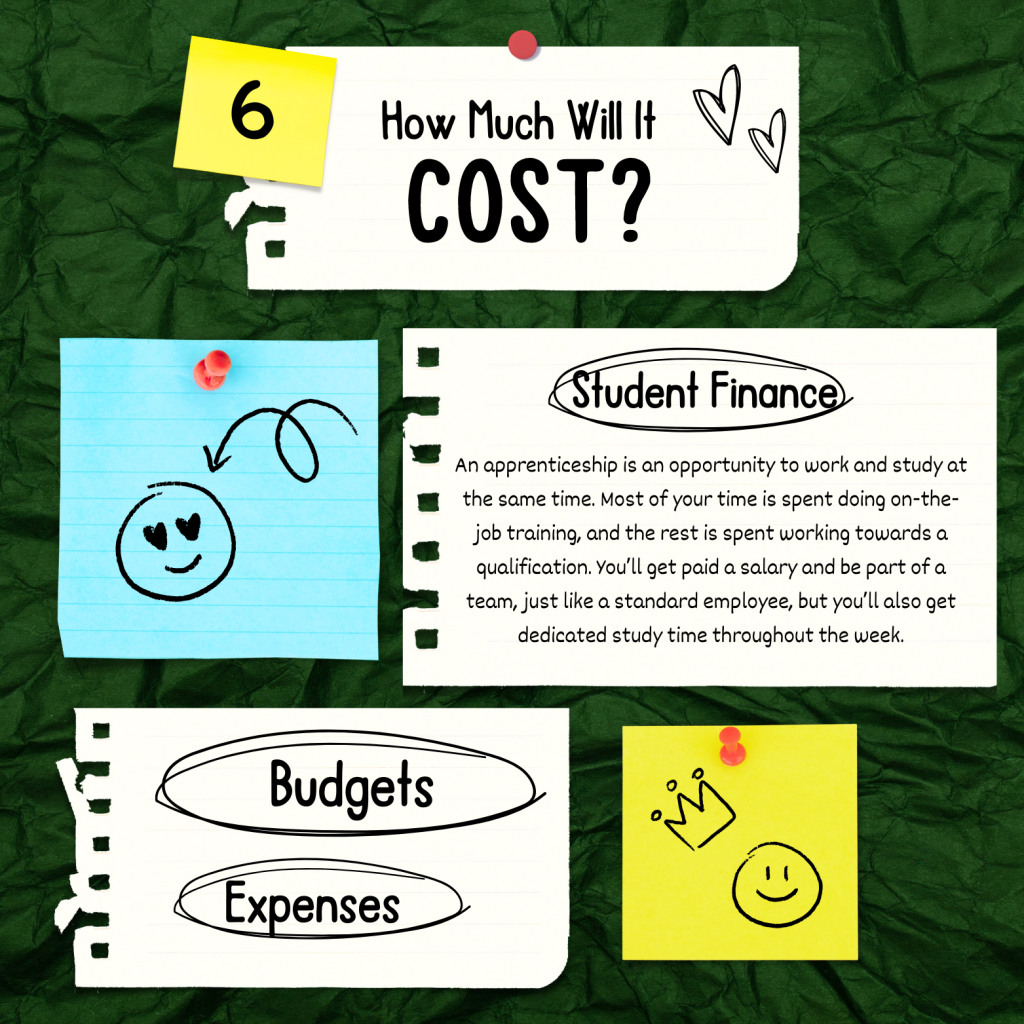
Undergraduate courses Tuition
Home Fees (for British and British Overseas Territory citizens)
From £9535 per year
International students
From £10,000-£38,000 per year
Degree Apprenticeships
Cost are covered by the employer and or the Government of the UK. The student will receive a salary.
Students will not qualify for a Student Finance Loan on a apprenticeship.
HND's or HNC's
Higher National Certificate: Depends on the course and the institution.
It can range from £4000-£10000 for Full Time Study
Example:
Engineering HNC – 1 year – University of Northampton is £9535
Engineering HNC – 1 year – Teesside – £4636
Higher National Diploma: Depends on the course and the institution
It can range from £4000-8000
Example:
Higher National Diploma in Sport – 1 year – De Monfort University – £6500
Graduate/MA Courses
Home fees: Depends on the institution
Average £8000-12000 per year
Example of a Masters course at a different price:
NFTS – Masters in Cinematography – £14,950 – 2 Years
International students
From £9000-30,000 per year
Accommodations
The cost of accommodation will depend on the city, the location of the accommodation within that city, the company who owns it, the room type and the size of the flat. The more rooms sometimes the less you pay.
Pricing of accommodations also depends on whether you are staying houses shared with other students or in accommodation buildings.
Author note: I suggest staying in one of the university recommended accommodations in your first year and once you’ve gotten acquainted with the city and your surroundings, you can look for a new place.
Note: Students are exempt from paying Council Tax
Prices average £70-200+ a week. Contracts are usually 44 weeks or 51/52 weeks. They can start from the first week or third week of September and end at the end of June/Mid July (44 weeks) or August(51/52weeks). Students can apply for an extension of a week or take up Summer leases if they decide to stay until the new school year.
Here are two examples of cost of private student accommodations.
Example: Ensuite room (separate room and bathroom)
£7140 | 51 week tenancy – £140/per week | 3 Bed Flat
Start Date: September 11th | End Date: September 2nd
OR
Ensuite room (separate room and bathroom)
£5708.57 | 44 Weeks tenancy – £135/per week | 6 Bed Flat
Deposit – £99
Start Date: Sept 16th | End Date: July 9
Some companies will ask for a deposit to whole your room. This can sometimes be subtracted from the overall price or it can given back to the student at the end of the tenancy once the room has been found in good condition.
If you like your accommodation and rebook, you can get discounts for the upcoming school year.
Signing the lease
This is a legal binding agreement. Make sure to read it thoroughly before signing. If there are terms you don’t understand, you can ask your university for help or ask someone you know. Once you’ve signed your lease it’s hard to get out of unless of extenuating circumstances which will be agreed upon by the landlord. If you want to leave, you sometimes have to find someone to fill your lease.
This can be done by putting out word online in forums or groups. Some students use Facebook to find new roommates.
Living Costs
- Phone Bill
- Music subscription (Spotify or Apple) Student discounts available
- Groceries
- Laundry
- Entertainment (Socialising – Cinema, restaurant, football game)
- Transport (Only if you don’t live within walking distance to your university and the amenities around you)
- Miscellaneous
- Emergency
Budget for when you arrive (furnishing your accommodation)
Budget for travel
Student Finance England
Student Finance England can include support towards the cost of your tuition fees, living costs and your course-related costs. It can take the form of a loan or a grant. There are also supplementary grants for specific categories of student, for example, disabled students.
Students from British Overseas Territory Students such as Cayman Islands, Anguilla, Montserrat, British Virgin islands and Bermuda are eligible for Student Finance England. The student must have been living in the UK or the British Overseas Territory for the past 3 years.
After eligibility has been established, the relevant authority will assess your, and/or your family’s, income to calculate the level of support to which you are entitled.
You can apply for Student Finance when taking these types of courses:
- an undergraduate and post-graduate degree
- a higher national diploma (HND)/higher national certificate (HNC)
- a diploma of higher education
- a teacher training course
- a certificate in higher education or a diploma/advanced diploma (Scotland only)
For more information: UK Council for International Student Affairs
Student Finance England provides a Tuition fee and Maintenance Loan.
- Tuition Fee loan goes directly to the university.
- Maintenance loan is paid directly into your bank account and used for living costs example accommodations and other expenses. It is a set figure and is paid in instalments. So you would be responsible to pay your accommodation fees. Since the loan comes in instalments, the accommodations will offer your payment schedule to be all upfront or in instalments.
British Overseas Territory Students can apply for a Tuition Fee loan ONLY from Student Finance England.
- If you are from an British Overseas Territory and you’ve been living in England for less than three years you can apply for a Tuition Fee Loan ONLY.
- If you are from a British Overseas Territory but you’ve been living in England for 3 years you can apply for a Maintenance loan as well. (Use your British Passport when applying)
For more information: Gov.uk
Author note: I know of students who have been successful in applying for a Maintenance Loan in their second year of studies coming directly from a British Overseas Territory. This is not something up on Student Finance England or the UK Gov website but its just something I have noticed.
Please note: You will have to:
- Download the tuition loan form from the website
- Fill it out by hand
- Send the filled out form along with their passport and any other documents (eg. divorce papers or birth certificate) requested through the mail to the office in London. They will send it back to you.
NHS Bursary
- This is for students pursuing students in medicine or dentistry along with a Student Finance Loan.
- The medicine courses are set up differently to other courses. They include placements, and can extend into the summer (July/August) while other courses end in May.
For eligibility requirements please visit here NHS.
Step 7: How to Prepare for Uni
Here are some things that will make it easier for you to transition into 'university/living away from your home for the first time' life
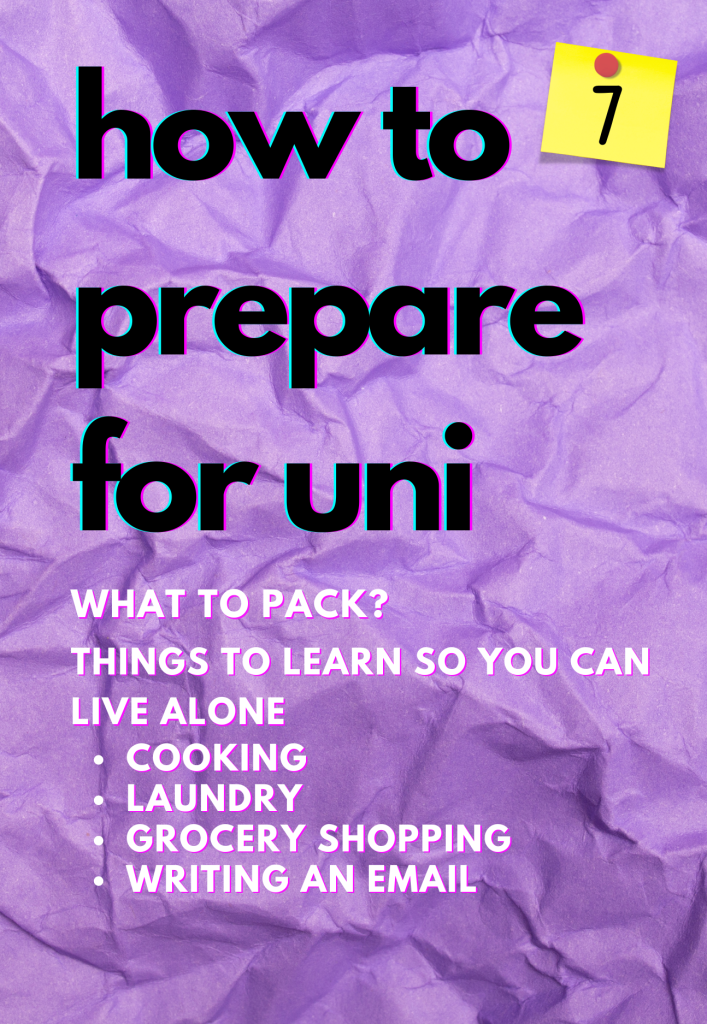
Learn to Cook
Start PRACTICING Now!
Find simple meals for those days when you’re stressed or really tired with school/work. Meals that use a few ingredients and something you can easily pick-up from the grocery store.
Learn how to cook a few or all of your favourite meals. This will help with transitioning into your new space and provides comfort for when you have homesickness.
Grocery Shopping
I know it might sound silly, but I am serious.
Have you ever gone to the shop by yourself and done a big shop? Do you know what good vegetables and meat looks like? Do you know how to check the expiry date of products? Do you know how to shop for ingredients to cook meals and not just buy snacks? Have you ever had to replenish oil, salt, seasonings, ketchup etc?
For some, your parents do all of the shopping and maybe you go in and pick-up a few things. Going from that to shopping for everything yourself can be very overwhelming.
Challenge yourself to go to the shop with a budget and a list of things and get everything you need. Don’t make the first time be after you’ve arrived, it’s going to be overwhelming.
Laundry
Can you do your own laundry?
Do you know how to separate your colours? What the difference is between laundry detergent and fabric softner is? Do you know what items shouldn’t use softner or what the symbols are on your clothes?
In the UK you will have the added use of a dryer, which for many they would not have ever used. Sorry no space for clothes lines, also its too cold for that.
Click this link for what items should NOT go in the dryer.
Writing an Email
Can you write an email?
During your university induction you will be given a university email address. That is how most if not ALL of your communications will come from your teachers, other university deparments and student unions etc.
If you have any issues, questions about assignments, querying a grade, you would have to send an email to your teacher. Some teachers setup Whatsapp groups for certain projects but I highly suggest keeping most of your queries through email incase you ever need receipts for something.
Also when applying for jobs or to just speak with your accommodations about an issue, you can send an email. Applying for a job or querying about anything. Emails are important here.
It doesn’t need to always be formal. But just learn how to be respectful and clear about what you want to say.
HAIR
Girls: Depending on the city you choose there is probably little to no hairdressers that can handle your hair type. Even if you find one, it may not be finanically feasible with your other expenses. So I suggest learning how to do your hair.
How to plait it, wash it, do quick dos. If you’re wearing a beanie during the winter you may want to stick to styles don’t require putting up your hair in a bun etc.
Boys: Depending on the city, it may be difficult to find a barber that can handle your hair type. If your hair is grown out, learn how to plait into singles or a few cornrows. Can you learn how to give yourself a shape up or if your hair is short keeping it low? It might be worth getting equipment to do it.
Tip: If you see someone else walking around in the city or at uni and you like there look ask them where they got the hair done. For some, they did it in their home town and travelled to uni or you may find some who got it done locally.
Check out this blog post on 'What to Bring to the UK'
Look Up!
Don’t think that you missed where you are going because it took you more than 5 mins to get to it. You will probably walk for 10-20mins in the airport just to get off the plane much less to get out after you’ve collected your luggage.
When you arrive at customs, if you are from Britain or an British Overseas Territory Citizen and you have a British passport go to the British Nationals line. There will be a machine where you put your passport down to be scanned and then you look into a camera. A light will turn green and the barrier will open. Once that happens, you will go to baggage claim, then find your way out to the train or coach terminals.
If you are feeling unsure about something ask someone.
You can either ask a worker who’s standing around or you can go up to any desk and ask a question. If they don’t know they will most likely know who to ask. You will see desks for foreign exchange and different things, just ask someone.
Wear good shoes!
You will be walking for a long time until you are able to open the door to your accommodations.
WIFI and calls
The airport should have open wifi. Use it until you are able to buy a SIM card. Check in with your family members and then look for a Sim Card Kiosk/Vending Machine. Buy a sim card (I suggest EE) then add it to your phone. It should start working instantly. That will give you data and you won’t have to be worried about WIFI. This number can be used across the entire country. You can visit your local EE store once you arrived to your city for upgrades and other plans if needed.
(I suggest keeping the pay as you go SIM. They will try to lock you into a two-year plan that is just not necessary. I promise you it doesn’t.
Once you are connected, make Google and Google Maps your best friend. If you are unsure about anything trying searching it up. You don’t want to miss your train or coach.
coach station
If you are travelling on the coach in Gatwick Airport, make sure to go towards the coach terminal not the bus terminal. You will end up in a completly different part of the airport. Coaches look like large regular buses, but they are not what the airport is referring to in England.
To get to the coach, you will have to take an elevator down. If you end up going up to something then you are in the wrong place.
The airport train station is in the South terminal. If you land in the north terminal it means that you will have to take the shuttle to the south terminal, then head down to the train station.
Train station & underground
The Airport train station is in the South terminal. If you land in the North terminal it means that you will have to take the shuttle to the South terminal, then head down to the train station.
The Underground is loud and it is a very weird experience to have right off the bat, especially with luggage. But you will make it. Look for elevators, because there are a lot of stairs and it would be easier with your luggage.
There are checkpoints before the train stations and underground that you can only pass with your ticket. At the barrier there is place to either scan or insert your ticket. There is usually someone there who can advise you on how to do it.
Wear headphones
Unless you are waiting for the arrival of the train, coach or another plane, wear headphones to help with the noise and over stimulation. If you’ve never travelled to a country as big as England, the airport can be a overwhelming.
Make a few playlists to keep you through the day. Download some TV shows and films on your device for when you’re waiting for transportation. You don’t want to fall asleep and miss it or miss your stop.
Remember the people at the train station, airport and coach want to help, it’s their job. They also know that August – October is the season for students arrivals, so don’t be shy about asking questions.
